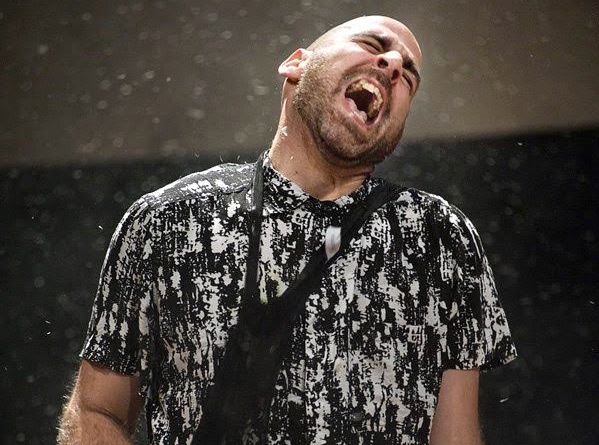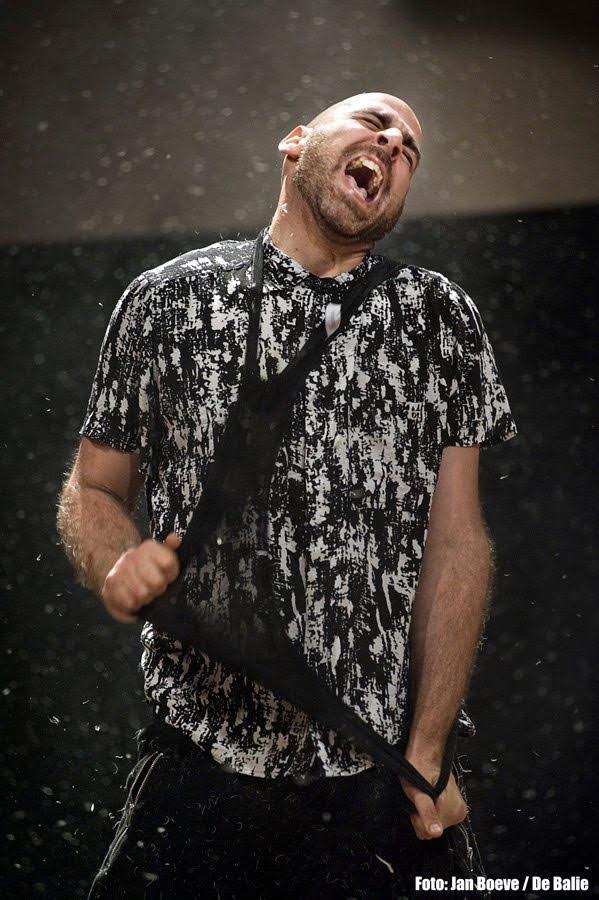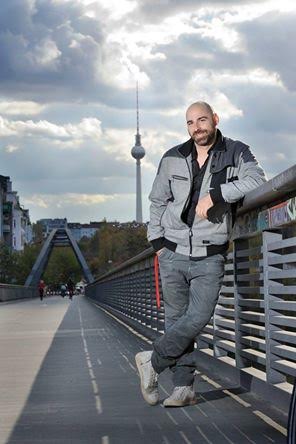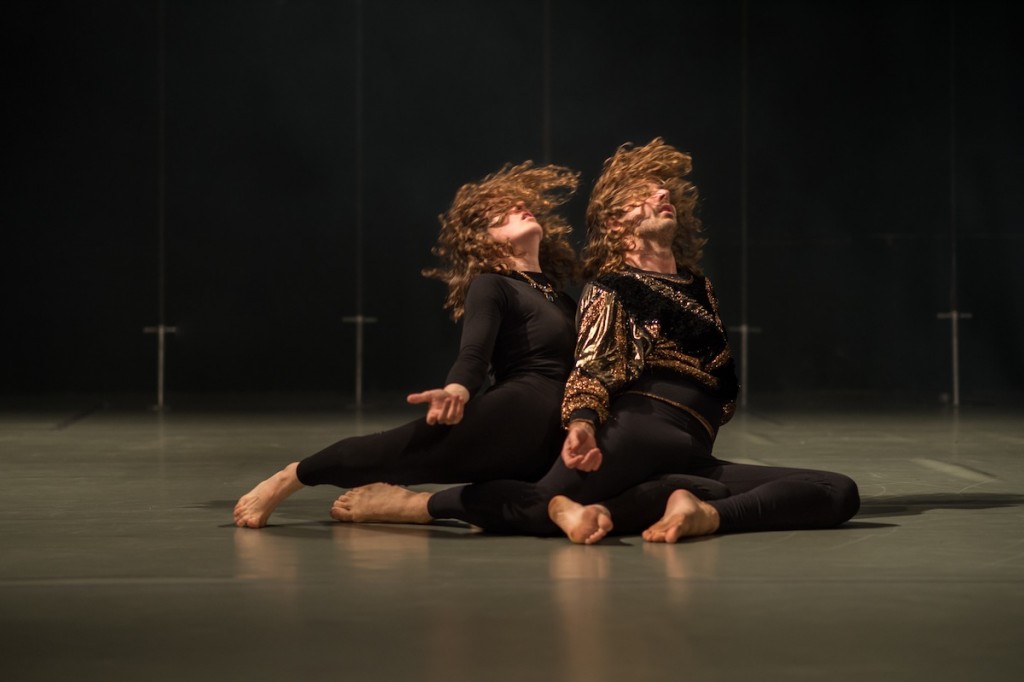He creates dance starting from biographies of ‘people of this world’ surrounding him. Slow Words loved it at the first glance. And he loves Tel Aviv but as many choreographers, he lives in Berlin.
Nir de Volff says of Tel Aviv: “ It is a bubble, a country inside of the country. It is like the Vatican, but free from every constraint. Venice and Tel Aviv are relative close, less than four hours flight, they should develop strong link…You have to know that Tel Aviv is one of the safest and free city in the world, given that I toured in many others like Sao Paolo, Bangkok, Moscow…Do not trust only what you see on the news, you should go and visit yourself!”
I saw his incredibly powerful dance in an Italian theatre, where he was signing half a pièce (Never Forever) with a pure theatre director, Falk Richter. It is the first time that happened to me to think that theatre and dance can go along very well by being created together: 105 minutes of dance and wording magically encapsulated in a nuthouse staging the frustrations of who is living in a perennial unbalance – the need and the fear of intimacy at the same time.
He loves the small audiences, whose choice for entertaining is more often the theatre, paying maybe a cheaper ticket than the opera houses ones.
This kind of audience, Nir says, waits for you at the end of the performance and likes to share and comment.
“My company name, Total Brutal, can fit a wide range of audience. At times, even those of 65 years old rich ladies that love opera houses, they come to see my performance…
I work with lots of freedom, humour and self irony – very important subjects of my art. The work is serious and often sad. The shows travel between both these elements. I work with people I know very well, it is always a very professional relation but we live side by side and we share each other life. It is not just as coming in an office and sending emails: I work with fragilities, lots of different realities in a very sensitive way: this comes across on the stage. One of my dancers, Florian, has energy for five performers, he speaks five languages: I know his former wife, his actual one and big slices of that have been staged in Never Forever.”
Your story in few lines with hints on your childhood, the studies, what do you do now
I was born in Israel. My mother comes from The Netherlands, my father from Iraq, they are both Jewish and they are divorced. My native city is Petach Tiqwa, its translation in English would stand as space for hope, but is a totally hopeless place, so there is already a dissonance in my past, in the place where I grew up. I went to a normal school, I do not have any special misery in my childhood. I discovered arts and dance at sixteen-seventeen. Then I went to the army and this was a very depressing period for me. You are restricted to follow rules when your soul is very young and is not yet adjusted to the world. You forced to learn how to use a gun! There is nothing more horrifying then the understanding you can kill someone.
Where did you serve?
I was lucky because I had a special status, being a dancer of excellence for Israel meant I did not have to fight. I was sleeping everyday at home. Then in the end I had a kind of psycho-crisis and couldn’t stay anymore in the army. Luckily, they moved me to the most luxurious place, the Radio station, in a great location in Jaffa. The end of my military service was ok, somehow. I made it. It was a period packed with meetings with very famous people and when being 21 this somehow matters. Today, any relation with army is very negative to me. After the military service, I started the real career of dancer. I created the first pièce when I was only 22: there was an urge since the beginning to create and not to follow only somebody else’s creations. This was happening in Tel Aviv and somehow life brought me very fast to Germany. That was the first time I was flying, the first time I was arriving in another country. Berlin was the city. I spent there two months and came back to Israel because I thought I was not ready to leave the land where I grew up. After three years I felt ready, I needed to open channels, having new possibilities and go back to Europe. I did really not know where I could stay, I really liked diaspora, to be an art immigrant, to discover new borders. I was an immigrant with a target, knowing what do you want to develop but not knowing exactly how. I was in between Brussels and Amsterdam for three years: I got support for my shows, I started to create with the excitement to be in a new place. And then I moved to Berlin, where I am since more than ten years. Stable.
Did you like the Berliner scene like the first days or do you feel a change?
I am a person of intuition. I arrive in a place and the first attraction is energy and intuition of where I am. I’m driven by energy. Some cities can be truly beautiful but then you do not have any feeling of energy or the need to develop something there. It is like love, you know. I just knew that Berlin is my city. Berlin was the first city where I felt at home in diaspora, after Amsterdam. I’m half Dutch so I came in Europe also to discover the life my grandfather was not able to have here (he was a Holocaust survivor): I thought that this was somewhere as well a mission.
Are you still happy to perform as International artist or do you feel your origin and your nationality very much important within your creation?
It is a very complicate question: I will always stay an immigrant who integrated but nobody will consider me to be German and I do not know if I want to be considered being a German. It’s a complex, because lately or sometimes I am ashamed to be Israeli with all the current right extreme political situation and at the same time I do not want to be recognize as German, as only German.
I’m on a bridge of a restless river, I’m crossing a river back and forth. But at the same time, every work I write and perform in Germany, the spectators and the donors see me always as Israeli choreographer. It’s not so easy to get objective artistic critic.
Even after ten years, even after you show that you’re serious, that you’re planning your roots in one space, in one city – where you give and take – you will be still a foreigner. I ignore how many years will take to let juries to do not doubt anymore that I’m there to stay and accept my Israeli humour, nonsense and high energy even if it’s different from what their ‘intellectual capacities’ would like to watch. Gravitation and the loss of gravitation… after all these years it’s a strange feeling.
As choreographer, which is your relation with the spoken word (not with the written one)? How do you feel yourself acting as a theatre maker rather than only a dance maker?
My work actually is based on words and movements. I’m not a standard choreographer who works only with the body. I like to mix the mind of the people I work with – their inner worlds, their political ideas, ideals and ideologies. In that sense, theatre is not a foreign language to me. It is part of my language. There is an important narrative part of different bodies/stories I tell. The spoken word also creates a need for a clear narrative of movements. It also creates layers that the body itself cannot express alone. The body itself is an object that with no words you could have thousand of interpretations about what it could mean. Once you add words, you direct what you want to say. It goes the other way, starting with text and searching for its physical meanings, the text has to relate with the body, there is not a domination of one part onto the other.
Were you frightened by the collaboration in NEVER FOREVER creativity once you started or just happy? It is a big deal to work in this way. Do you meet him long ago, is it a long collaboration?
I was working before on big productions such as at the Frankfurt Opera House, Sao Paulo national theatre, Bangkok national university, HAU theatre Berlin with She She Pop etc… I am familiar with a work in big frame.
I am always excited once I start a new work, doesn’t matter with whom. Fear? I have zero fear! I have doubts, thoughts: why I should wake up in the morning and go to the studio if I have fear? I think that fear in the studio creates limitation. The reason I was curious to start a project with Falk Richer is that he starts to create from zero, with no script. Every project I do, I start from zero. I have an idea, I have cast, I have stage design, I deal with costumes. Nothing is written beforehand. Theatre usually doesn’t work this way. There is already everything existing and all is about the director’s interpretation. Now I am going to work with another theatre director at Maxim Gorki Theatre in Berlin and there I will try something new: I’m going to work with a theatre pièce and only with actors.
Maybe I am more ‘Italian like’, in that sense, I feel free, not planning much, enjoying the moment. As for the Israeli energy, we say that every day is a new day and there are countless possibilities. I can define myself very mobile: I work also in galleries and art spaces with my dance-performance shows. It’s a new direction for my work. I am the kind of person who has to renew and not repeat again, again and again. I always get excited from new ideas, new performing forms and spaces.
Which is the greatest achievement, at the moment, you’ve reached as choreographer and as for the more intimate yourself?
As a choreographer, to be able to play in the smallest theatres in front of sixty people as well as in biggest ones in front of thousand people. To do not be blind only by thousands of people and ignoring those beautiful sixty people sitting in front of you. One of my most outstanding performance in Berlin was a site-specific one in the most famous Synagogue of the city, it was very controversial. For me this means to know how to be diverse.
As a person, to be able to keep my relation with my Israeli friends as if I have never left.
The book and the music with you now?
A Brief History of Human kind by Yuval Harari (it surveys the history of human kind from the evolution of archaic human species from the Stone Age up to the 21st Century). Right now I listen a lot Umm Kulhtum, she was the biggest diva of the old classic Arab world music, from Cairo. And she had a very famous song, Enta Omri (You Are My Love). I’m fascinated by her voice and passion. And Bjork, the new album especially. She is a great artist, very consistent and always visual: I like artists with strong notions on their performance.
Which is your strategy to live slowly, if you succeed?
I’m a slow person when it makes sense. When I go to Tel Aviv, on the beach, I’m surely living slowly, I just need to take a short bike ride to go to the sea. It relaxes me a lot, it gives me sense of home, where I understand the language 100% and where there is always my mother: in the worst case, I can come back to her for a couple of nights. This ambient creates some ‘silence’, in Germany we say Rühe, a moment when you stop the thoughts, you cannot never do it completely but there I get a good approximation. When we were younger, some friends were used to go for few days in Sinai, but I never got the concept to go somewhere in order slow down. I’m the opposite, I have to go faster. And the only place where I’m slow is the beach: there, the waves can go fast.
What your city (I presume Berlin) is giving to you and vice versa?
Yes, my city is Berlin. I know most of it and I give a lot to it. But I have two personalities, though. I will not ‘have’ Berlin without Tel Aviv and the other way around. I have a Dutch passport, I’m very safe in Europe and nobody can kick me out (in relation to what often happens!). In Berlin I work in spaces and create different shows. In Tel Aviv I do not work that much but I do have a deep bond, an on going love.
I give my life to Berlin: with me, you can laugh from sadness and be entertaining from loneliness. I hope to give the inspiration for creativity. Intelligence and humour, well combined with the energy of the body, is the best gift I can give. I see lots of minimal dance without energy, on the contrary I feel that the audience appreciates much more the energy gift. Then, at that point, you get also the energy back.
What did you learn from life until now?
What I’m learning – it is still in the process – is that life can end now and I want to enjoy more and more, without thinking about the next ten years. It is a big challenge for me, to live and enjoy now. To plan less the tomorrow.
Today – at Schaubühne, Berlin – Never Forever is on stage (and again it will be on October 16 and 18): to learn more about the next performances of the company:
http://www.totalbrutal.net/Site/total_brutal.html



